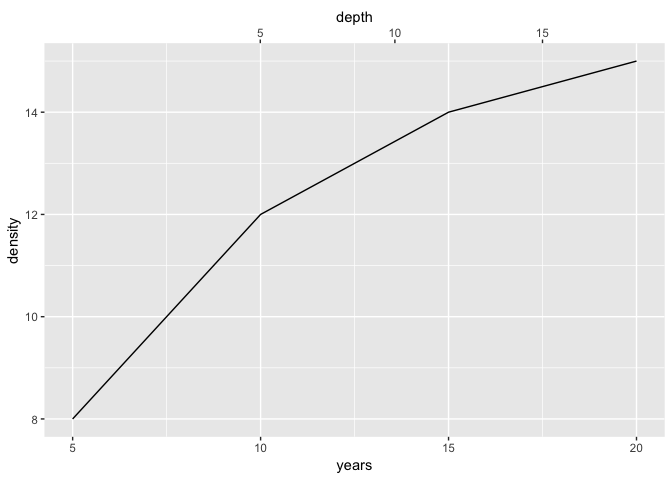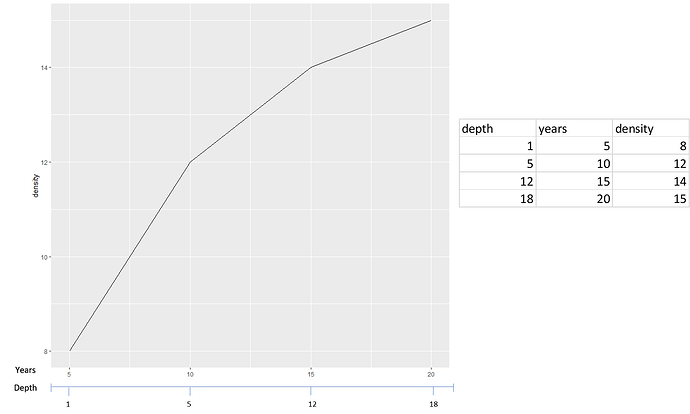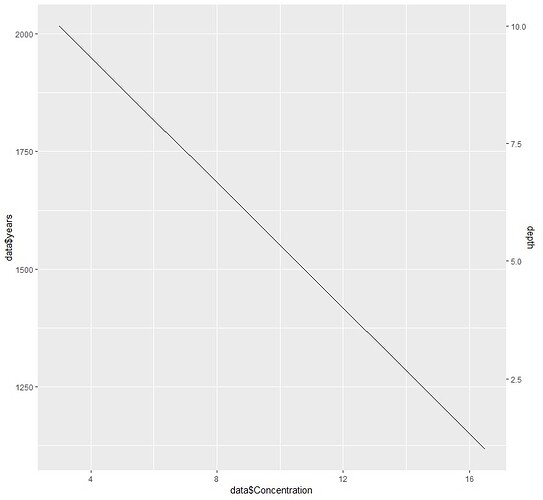Hello,
I create a plot (using ggplot2) that deal with the density (y) in function of the years (x). Each year is associated with a certain depth. I want to have a visual representation of the link between years and depth. How can I do to add an axis, or rather a graduated scale with these depths below the years axis ? Thank you for your answer.
Here is an example with a fake dataset :
I wrote a package to do just this (among other things)! The tidypaleo package will let you create a dual age/depth axis in ggplot2 (although the axis will appear on the other side of the plot).
library(ggplot2)
# remotes::install_github("paleolimbot/tidypaleo")
library(tidypaleo)
test_data <- tibble::tribble(
~depth, ~years, ~density,
1, 5, 8,
5, 10, 12,
12, 15, 14,
18, 20, 15
)
# create an age-depth model using tidypaleo::age_depth_model()
model <- age_depth_model(
depth = test_data$depth,
age = test_data$years
)
# use scale_x_age_depth() to create the second axis
ggplot(test_data, aes(x = years, y = density)) +
geom_line() +
scale_x_age_depth(model, depth_name = "depth")

Created on 2019-04-03 by the reprex package (v0.2.1)
It's possible to do this manually as well using sec_axis(), but it is complicated enough that using age_depth_model() is probably your best bet. Another option would be to use a geom_text() and/or geom_vline() to put the age and/or depth information on the plot directly.
Thank you so much for your help, I finally managed to make this graph.
I've just another question, in fact when I build my graph the age axis is reversed for exemple instead of having 2015 for a depth of 1 cm I have -3000. Do you have an explanation ? I don't know how only reversed "one part of the X graph" ... I even try to modify my dataset and to associated 1 cm with -3000 but the result was the same... Does anyone have the solution ?
Hi,
This would be easier for people to answer if you provided your code, plus example data that illustrates the problem, preferably as a REPRoducible EXample, eg using the reprex package.
Ron.
Hello,
data <- read.delim("data1.txt")
Here is my data set :
data <- wrapr::build_frame(
"depth" , "years", "Concentration" |
1L , 2017L , 3 |
2L , 1917L , 4.5 |
3L , 1817L , 6 |
4L , 1717L , 7.5 |
5L , 1617L , 9 |
6L , 1517L , 10.5 |
7L , 1417L , 12 |
8L , 1317L , 13.5 |
9L , 1217L , 15 |
10L , 1117L , 16.5
# create an age-depth model using tidypaleo::age_depth_model()
model <- age_depth_model(
depth = data$depth,
age = data$years
)
ggplot(data, aes(x = data$Concentration, y = data$years)) +
geom_line() +
scale_y_age_depth(model, depth_name = "depth")
I've try with the fonction reversed but that didn't work or I don't know how to apply it...
I couldn't run your code, I don't have wrapr installed and your code for that call isn't complete (it is at least missing a ")".
But there is an obvious error in your ggplot call, in that you shouldn't refer back to the data.frame when specifying columns in calls to aes, eg:
ggplot(data, aes(x = Concentration, y = years)) +
geom_line() +
scale_y_age_depth(model, depth_name = "depth")
Ron.
This topic was automatically closed 7 days after the last reply. New replies are no longer allowed.
If you have a query related to it or one of the replies, start a new topic and refer back with a link.

